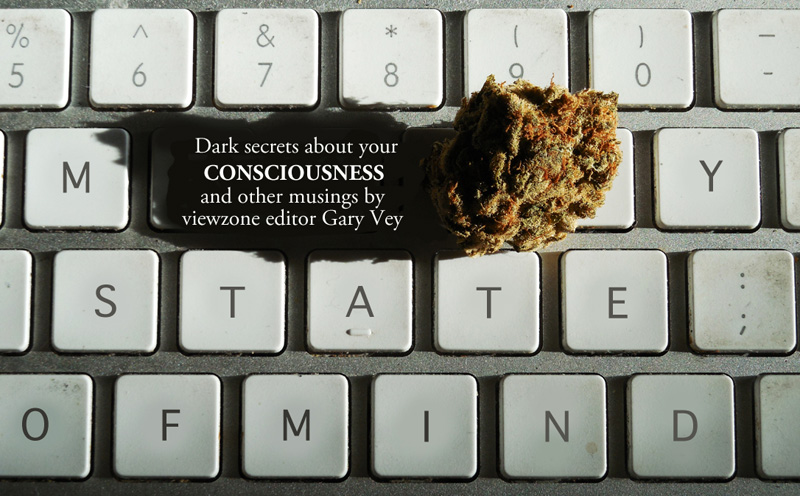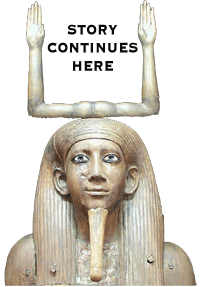
Congratulations!
Wow. You have come this far, reading my story and sticking with it. While you might not be totally convinced about the bicameral mind and our present consciousness, you have at least not turned away from the idea. You have an open mind and you shall be rewarded.
This new way of looking at the human mind allows us to see various cultural phenomena in a different light. Whereas the modern view of things is to see philosophy, psychology and religion as different fields of investigation, hopefully you can now see that they are really one and the same.
Here's what was surprising to me.
Who you are is who you were
Who you are -- your identity, personality and individuality is an evolving and cumulative thing that is an unconscious process. Your personality is revealed to you as you experience yourself interacting with the world. Decisions and judgements, morality and free-will are all dependent upon what you have already accumulated in your unconscious mental experience. To make changes to who you are, you must cultivate new experiences over time and allow them to become part of your world view.
Think of your world view as a grape vine, continually growing, changing and expanding. Where it moves mostly depends on the previous growth of its stems and branches, which support the vine. But the grape vine can be pruned and trained to grow in specific ways that maximize the yield. These changes require periodic tending by a gardner.
Because this is how our personality is formed, we can appreciate the modern saying, "garbage in, garbage out." Who you are -- what elements of reality your unconscious is allowing to reach your consciousness -- is determined by past experiences that have formed your world view.
There really is no spontaneous free will or volition. Even decisions to change yourself come from some prior experiences that suddenly emerges at the top of the motivational hierarchy. For example: your decision to continue reading this story depends on something that happened to you in the past.
The problem defined
Since acquiring consciousness, the focus of attention of the subjective self, on itself, has created numerous conflicts in the world motivated by ego, lust and greed. This did not go unnoticed by some gifted and conscious intellectuals. Over the past 3000 years some great minds have suggested solutions to deal with the negative aspects of consciousness.
One important thing to consider is how each solution deals with the anxiety stemming from our awareness of our own impending death. Psychologists call this
While I can not cover all of these solutions, I will cover the teachings of the most significant minds: Lord Krishna, the Buddha, Jesus, Mohammed (PBUH), Carl Marx, Thoreau, and perhaps a few more (if I am still alive). Each of these characters, whether they are real or composites of myths and historical figures, offered a solution to the breakdown of the bicameral mind and the evolution of the conscious, subjective self.
So let's begin.
As people developed writing, there grew inside of their mind a voice that spoke the words. You are probably doing this right now as you read this. The plasticity of the brain resulted in the development of networks where an internal voice was activated, especially in scribes (Sargon of Akkad, Moses, etc.), to give voice to what was being read and more especially to give voice to memorized texts and new compositions.
As people exchanged ideas and stories, they became aware that some had similar ideas while others did not. The understanding that other people can think and see the world from their own unique perspective gave way to the subjective "I" which became the main character in the on-going narrative of the inner voice.
Somewhere in this stage of mental evolution the newly invented self began to ignore the guiding bicameral voice in favor of its own wisdom based on what is best for the "self". The connection to the benevolent voice was gone and civilization began to devolve into endless conflicts, barbaric wars and human atrocities. People began to formulate their own voices which spoke of tribal, national and personal goals and these goals were pursued with an "the end justifies the means" philosophy.
Sri Krishna & Hinduism
From about 5000 to 3000 years BCE, the bicameral voice, Brahma, spoke to men in India. The speech, as was typically the case, was in prose and often told stories which revealed valuable teachings. These stories were recited orally until they were written down in Sanskrit around 1700 BCE. Called the vedas, this collection of ancient bicameral wisdom became the law and design for living in what is now known as Hinduism.
In this system of reincarnation, one can be reborn multiple times until the personality is perfected, at which time one resonates and merges with Atman, the singular deity with many diverse identities. Prior to that, there are possibilities to advance in status and comfort or be demoted and born again as an animal, or worse. The current status is always temporary and one is always working to better one's karma.
So, in short, mortality salience is reduced by the idea of reincarnation and the promise of salvation and union with god, revealed in ancient texts spoken by the bicameral voice of eons ago.
For most of the followers of Hinduism, the self remains intact and suffers the daily rigors of survival with the hope for salvation -- freedom from the cycle of rebirth -- and moshka, the merging with god. Later rather than sooner.
They rely on the priestly class to mediate with the voice of the deity and their involvement in the religion is mostly ritualistic practices left over from the bicameral days of the vedas.
As a result, a strict caste system developed where the priests mediate with the gods, under which are the businessmen, laborers and untouchable classes. This recipe for social upheaval is mediated by the need for each class or caste to perpetuate the belief in karmic rewards and penalties, but for most ordinary Hindus this caste segregation sucks.
One of the most influential stories in the vedas is the Bhagavad Gita which features a heroic prince, Lord Krishna, who is really the incarnation of the Supreme God. Besides giving the revelation of how reincarnation and karma works, Krishna is depicted as an amiable, child like but strict leader with blue skin. He is believed to have been an actual king more than 5000 years ago. His life and teachings, along with other inspired stories contained in the vedas and Upanishads, serve as the philosophy and world view of Hinduism.
Was it successful? For a while it was. By about 500 BCE, well into the age of consciousness, even the vedas were losing their appeal as the elaborate rituals prescribed in their texts did little to change the hardship and misery of daily life for most ordinary people, most especially the lower castes. Today, one need only look at Hindu cultures to see that it has not brought forth a system of guidance that leads to happiness and prosperity.
In the West, we mostly think of Hinduism as dealing with lots of mysticism, meditation and yoga. This view was made popular by the Beatles back in my day. Hindu holy men or gurus, seeking to understand the mind, often tried to subdue the subjective "I".
Since the self is chiefly identified with the physical body, meditation techniques of gurus often involved social isolation, poverty, suffering, discomfort, starvation and often years of training their minds to avoid contemplation of the physical self and be receptive to the bicameral voice.
A good example, if you are interested in this sort of thing, is the life of Ramakrishna (fairly recent in 1886 AD), who perfected this ability.
This is still going on today. Unfortunately the negative aspects of consciousness, pride and greed, have corrupted these teachers. They quickly become part of a cult of personality where they are more revered than their teachings. Sai Baba, Maharishi Mahesh Yogi and the fat boy, Maharaj Ji (now a retired airline pilot) come to mind.
Then again, the shining story of Mahatma Gandhi provides an example of what could be achieved by the application of Hindu principles to improve social conditions.
One of the things that always struck me when reading the ancient Hindu texts is that the author always says that enlightenment, understanding how the mind works, is only possible through training from an experienced guru. They repeatedly claim that it cannot be achieved by much learning or practicing -- only from a teacher who has achieved it.
This apparently excludes lots of people. One only need look at a Hindu country like India to see that, as a solution to the miserable condition of humanity, it falls short. Real short.
Next: Buddha
Thanks again for the kind words... (later)
 The solution to mortality salience was the introduction of a universal system where one would die and be reborn. The character of the next life will be determined by the present life's behavior and cumulative personality traits, called karma.
The solution to mortality salience was the introduction of a universal system where one would die and be reborn. The character of the next life will be determined by the present life's behavior and cumulative personality traits, called karma.  These brief states of re-connection with the bicameral voice were often successful, called samadhi. The same kind of benevolent and wise guidance was obtained in these states as the oracles and sybils of the Mediterranean. The practice, although part of Hinduism, is accessible only to the few individuals who can tolerate the austere requirements. It's not for everyone.
These brief states of re-connection with the bicameral voice were often successful, called samadhi. The same kind of benevolent and wise guidance was obtained in these states as the oracles and sybils of the Mediterranean. The practice, although part of Hinduism, is accessible only to the few individuals who can tolerate the austere requirements. It's not for everyone. There is another world -- not many hear of him and of these who do, not many reach him... He cannot be reached by much thinking -- but by a teacher who has seen him only.
